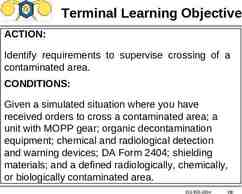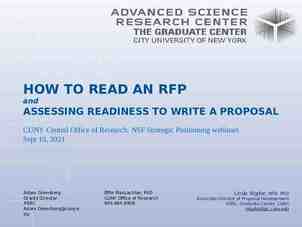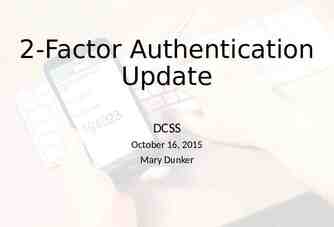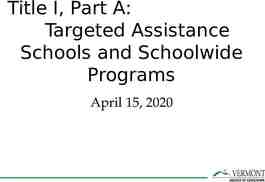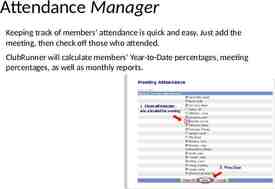Chapter 3 Learning Objectives Define, spell & pronounce the
36 Slides218.81 KB

Chapter 3 Learning Objectives Define, spell & pronounce the terms listed in vocabulary. Explain the reasons professionalism is important in the medical field, & describe work ethics Discuss the attributes of professional medical assistants, & project a professional image in the ambulatory care setting. Identify obstructions to professional behaviors. Define the principles of self-boundaries. Describe the dynamics of the healthcare team Apply time management strategies to prioritize the medical assistant’s responsibilities as a member of the healthcare team. Summarize the role of professional medical assistant organizations.

Professional Behavior in the Workplace Page 32 - 39

Page 32 The Meaning of Professionalism Professionalism having a courteous, conscientious, & respectful approach to all interactions & situations in the workplace. The attitude of those in the medical profession generally is more conservative than that seen in other career fields. Patients expect professional behavior & base much of their trust & confidence in those who show this type of demeanor in the healthcare facility.

Page 33 Work Ethics Work ethics sets of values based on the moral virtues of hard work & diligence. A person who has a good work ethic is one who arrives on time, is rarely absent, & always performs to the best of his or her ability. Most new hires have a probationary period that may least 30 to 90 days. Any absences or tardiness during the probationary period can be grounds to terminate the employee once the probationary period is up or even before that if multiple attendance issues arise.

Page 33 Work Ethics: Cont. If the medical assistant has an emergency & must be absent or tardy, he or she should make sure to notify the supervisor according to office policy. Providers All & patients alike expect this reliability. employees should know, & follow, the attendance policies of the facility as outlined in the policies & procedures manual.

Page 33 Attributes of Professional Medical Assistants Patients often see the medical assistant as an extension of the provider & healthcare facility. As representatives of the healthcare facility, medical assistants must consistently display professionalism through their attitude, appearance, & behavior. Regardless of the situation, the medical assistant must always act professionally.

Page 33 Attributes of Professional Medical Assistants: Cont. Courteous & Respectful Treating patients with courtesy & dignity are crucial to interacting with patients professionally. Courteous behavior is polite, open, & welcoming. Despite patient attitudes or the stressors in your personal & professional life, you must always treat patients with respect. Patients expect to be treated as individuals, not just another health problem.

Page 33 Attributes of Professional Medical Assistants: Cont. Display positive nonverbal behaviors, including using an even, calm tone of voice; establishing eye contact; & taking the patient into a private area to discuss problems. Always use proper grammar, without slang words, to demonstrate your respect for the individual Explain medical treatments & conditions with simple lay language rather than expecting the patient to understand medical terminology.

Page 34 Attributes of Professional Medical Assistants: Cont. Demonstrate interest in patients as individuals. Recognize the personal biases that you bring to the field o medical assisting & how they can affect respectful patient care. Respect the role of other members of the healthcare team in meeting the needs of patients & families. Demonstrate sensitivity to the patient’s & the family’s needs Maintain patient confidentiality.

Page 34 Attributes of Professional Medical Assistants: Cont. Diplomatic & Tactful A diplomatic & tactful person always attempts to interact honestly without giving offense. The medical assistant must be sensitive to the needs of patients & co-workers, especially if the person you are communicating with is upset. What methods can the professional medical assistant use to communicate diplomatically & tactfully with co-workers & patients?

Page 34 Attributes of Professional Medical Assistants: Cont. Respond calmly to problematic situations with reflection, making sure the patient knows you recognize how he or she feels about the problem. Consistently communicate politely & honestly. Gather feedback about the possible causes of the problem Recognize the needs & rights of others & attempt to reach a mutually beneficial resolution to the problem.

Page 34 Attributes of Professional Medical Assistants: Cont. Assess your personal response to the situation & do not allow your personal beliefs & biases prevent you from interacting diplomatically & tactfully with patients, families, & co-workers. Provide patient- & family-centered care. Show sensitivity to the needs of health care team members.

Page 34 Attributes of Professional Medical Assistants: Cont. Responsible & Honest A responsible medical assistant is one who is dependable. The healthcare team must be able to rely on the medical assistant to perform all his or her duties within the accepted standards of care. Practice managers should be confident that once given a task to do, the medical assistant will carry it out accurately & in a timely manner.

Page 34 Attributes of Professional Medical Assistants: Cont. At the same time, if an error is made or there is a problem performing a particular task, the medical assistant must honestly report these issues to immediate supervisor. Patient safety is the number one priority, & anytime it is compromised, the medical assistant must report the problem so that the patient can be safeguarded against any further injury. Dependability & honesty are critical components in earning the trust & respect of others.

Page 34 Attributes of Professional Medical Assistants: Cont. How can an entry-level medical assistant perform his or her duties with responsibility, integrity, & honesty? Interact with patients in a straightforward, honest manner while supplying all the facts, using lay terms so the patient understands & can make educated decisions Be thorough & pay close attention to detail so that the patient is confident you are a responsible professional.

Page 34 Attributes of Professional Medical Assistants: Cont. Never misrepresent yourself or the medical practice. Honestly recognize your own limitations & do not hesitate to seek guidance or assistance if you are not sure of a particular administrative or clinical procedure. Accept responsibility for your failures or errors & determine how to prevent them from occurring in the future.

Page 34 Attributes of Professional Medical Assistants: Cont. Response to Criticism It can be very difficult to receive negative feedback in the workplace. However, constructive criticism is a way for us to recognize that there are areas in which we need to improve our skills & develop more professional methods. To grow beyond entry-level skills, the medical assistant must be willing to recognize any weaknesses & use this feedback.

Pages 34 – 35 Attributes of Professional Medical Assistants: Cont. Professional Image How you appear affects the way you are treated & what others think of you. Important assumptions are made within seconds of meeting someone, based only on how they look. Let’s consider some standard guidelines for the appearance of the professional medical assistant.

Pages 34 – 35 Attributes of Professional Medical Assistants: Cont. Most medical facilities require medical assistants to wear uniform or scrubs; Hair should be clean & not overly styled. Shoes should be clean Nails should be cut short & without nail polish (no artificial nails). Tattoos & body piercings are not considered professional, so medical assistants must follow office policy about their appearance.

Page 35 Obstructions to Professionalism Personal Problems & “Baggage” When a situation intrudes on our thoughts at work, it is best to take time to talk to a supervisor. It is not necessary to share the intimate details, but a quick explanation that some difficulties that are occurring outside of work helps the supervisor understand any changes in habit or attitude. The workday should be focused on delivering quality patient care; therefore, do not allow personal business to interfere with the time that should be spent assisting patients & the provider.

Page 35 Obstructions to Professionalism: Cont. Rumors & the “Grapevine” Most people enjoy working in an environment in which employees cooperate & get along with each other, but rumors can cause problems with employee morale, & often are exaggerations or manipulations of the truth. A medical assistant should refuse to participate in the office rumor mill & should attempt to be cordial & friendly to everyone at work. Supervisors regard those who spread or discuss rumors as unprofessional & untrustworthy.

Page 35 Obstructions to Professionalism: Cont. Personal Phone Calls & Business Don’t take unnecessary phone calls from friends & family at the office. The office phone is a business line & must be used as such, except in emergencies. Using personal cell phones during working hours is not acceptable. Visitors should not frequent the office, especially the area where the medical assistant is working. If someone must come to the office, always offer the reception area as a waiting room. Visitors should never be allowed to enter patient areas.

Page 35 Obstructions to Professionalism: Cont. Checking personal e-mail also should be avoided in the workplace. Any type of personal business, such as studying, looking up information on the Internet for personal use, Internet shopping, or using social media should be done at home & not in the office. Many employees are fired each year for surfing or shopping on the Internet for personal reasons or for checking personal email. Make sure all personal business is handled outside of business hours.

Page 36 Establishing Healthy Self-Boundaries We all determine our physical, emotional, & metal limits & use them to protect ourselves in both our personal & professional lives. Personal boundaries are developed to protect us from being manipulated or used by others. We expect those we live & work with to recognize & understand our personal limits, but at the same time we must respect the self-boundaries of others.

Page 36 Establishing Healthy Self-Boundaries: Cont. Working out personal differences requires honest communication & compromise so that everyone understands your position & recognizes that you are willing to be a team member. This process starts with you recognizing that your needs & feelings are not more important than those of anyone else, but also that your preferences are just as important & deserve to be recognized.

Page 36 Establishing Healthy Self-Boundaries: Cont. Establishing healthy self-boundaries results in: Improved self-confidence Better ability to communicate honestly with others Relationships based on honesty & respect

Page 36 The Healthcare Team Teamwork is high on the list important attributes Staff members must work together for the good of the patients. Be willing to perform duties outside of the job description if they are needed in other areas of the office. Supervisors frown on employees who state, “That’s not in my job description.” If the task is illegal, unethical, or places the patient or anyone else in danger, it should not be done.

Page 36 The Healthcare Team: Cont. If you have an issue with another employee, the first move would be to discuss it privately with the other person. If the situation does not improve, a supervisor (office or practice manager) should be involved for further discussions. Do not bring the provider into the discussion unless there is no choice because the facility manager is expected to deal with personnel issues.

Page 36 Time Management You must prioritize your duties & arrange the schedules to ensure that these duties can be performed. Taking 10 minutes to write down the tasks for the day helps ensure that they are done. Stay on schedule throughout the day, unless you are interrupted by emergencies. Even then, when days are well planned, allowances can be made for emergencies & most tasks can still be completed. The key to managing time is prioritizing.

Page 37 Time Management: Cont. Prioritizing Prioritizing is simply deciding which tasks are most important. Many people make a “to do” list for the day’s activities, but the secret to success is prioritizing those activities into categories that give order to the tasks. Most tasks can be prioritized into three general categories: those that must be done that day, those that should be done that day, & those that could be done if time permits.

Page 37 Medical Assistant Organizations Participation in a professional medical assistant organization has multiple benefits: AAMA legal counsel represents medical assistant across the US to fight for the rights of medical assistant practice. Membership shows a level of seriousness about your chosen profession. Members receive a complimentary subscription to CMA Today, an informative magazine devoted entirely to the medical assistant profession

Page 37 Medical Assistant Organizations: Cont. The CMA (AAMA) Exam is one of the credentialing exams offered to medical assistants. Another possible credential for medical assistants is the Registered Medical Assistant (RMA). Becoming credentialed as a medical assistant has definite benefits. For many new medical assistants, an earned credential improves their chances of getting & keeping a job in today’s healthcare environment.

Page 38 Closing Comments Behaving in a professional manner in the medical office helps gain the patient’s trust. Trust is one of the most important factors in preventing cases of medical liability. Performing as a cooperative team member goes a long way in promoting a positive healthcare environment for the patient. Incorporating time management strategies into each day not only helps you perform tasks more efficiently, but also ensures that no important tasks are left uncompleted.

Page 38 Closing Comments: Cont. Patient Education Most patients do not understand many of the phrases used by the medical community. Always be patient & explain any aspect of the instructions the patient does not understand. If the patient seems concerned about revealing pertinent information, assure the person that medical assistants & the rest of the staff in the facility are bound by rules of patient confidentiality.

Page 38 Closing Comments: Cont. Before the patient leaves the exam room, make sure to ask, “Do you have any questions?” This gives patients the opportunity to get all their questions answered before they leave the facility. A professional medical assistant does not share personal information with anyone at the medical facility. Refrain from passing along rumors of any type to patients or their families.

Page 38 Closing Comments: Cont. Legal & Ethical Issues The workday should centered around patient care, so never allow personal business to intrude. Otherwise, the patient may be left with the impression that you, or the entire staff, are unprofessional, & this often leads to trust issues. Professional credentialing is becoming more important each year. To safeguard future practice rights, medical assistant should become credential as either a CMA (AAMA) or an RMA.

